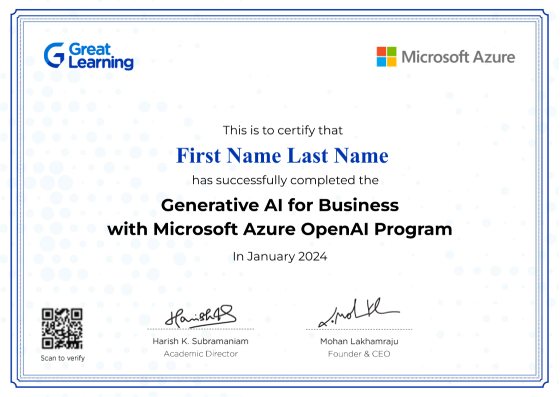Get the program brochure
Check out the program and fee details in our brochure

Generative AI for Business with Microsoft Azure OpenAI
Learn generative AI with code & no-code on Azure & OpenAI
Application closes 30th Apr 2024
- Program Overview
- Curriculum
- Certificate
- Tools
- Projects
- Faculty
- Fees
Key Highlights of the Generative AI Program
-

Microsoft Azure AI Fundamentals training
-

Prompt Engineering without and with code
-

Azure Lab access with OpenAI Studio
-

Learn from experienced industry mentors
-

8+ hands-on case studies, 2 hands-on projects
-

Dedicated Program Manager and Academic Support
Skills you will learn
- Prompt Engineering
- Using OpenAI API
- Using Python SDK for Prompt Engineering
- Microsoft Azure Cloud Services for AI
Great Learning alumni work at top companies
Curriculum
This curriculum, divided into five modules, offers a comprehensive understanding of Azure OpenAI and Generative AI. The first module delves into AI, ML, LLMs, and Prompt Engineering, guiding you through Azure's OpenAI services. The second module offers proficiency in using the Azure OpenAI API key and Python SDK, allowing hands-on learning with Generative AI applications in text classification and summarization. At the end of the course, you'll have the skill set to apply Generative AI across various tasks, from content generation to creating prompts, all without writing a line of code
Read more
Unit 1
Module-1: Introduction to Generative AI
This module serves as an introduction to the rapidly evolving field of Generative Artificial Intelligence (AI). The primary focus for this week is to gain a comprehensive understanding of the Generative AI landscape, including its foundational concepts and the potential it holds for businesses in problem-solving and product creation.
Week-1: Generative AI: Business Landscape & Overview
The outcome from this week is to understand the Generative AI Landscape, fundamentals and possibilities for businesses to solve problems and create products
- Defining AI, ML, DL, LLM and Generative Models
- Learning supervised and unsupervised ML tasks
- Understanding Generative and Discriminative AI
- A brief timeline of Generative AI
- A peek into generative models
- Deconstructing the behavior of a large language models
- ML, DL and GenAI applications in business
- Hands-on Demonstration of popular tools (ChatGPT, DALL-E, BLIP)
Unit 2
Module-2: AI900: Azure AI Fundamentals
This module is designed to provide a foundational understanding of machine learning, AI concepts, and associated Microsoft Azure services. While Azure AI Fundamentals can be beneficial in preparing for Azure role-based certifications such as Azure Data Scientist Associate or Azure AI Engineer Associate, it's important to note that it is not a mandatory prerequisite for any of these certifications.
Week-2: Artificial Intelligence workloads and fundamental principles of machine learning on Azure
Focus on recognizing features of typical AI workloads, understanding principles for responsible AI, and gaining familiarity with common machine learning techniques.
- Identify features of common AI workloads
- Identify guiding principles for responsible AI
- Identify common machine learning techniques
- Describe core machine learning concepts
- Describe Azure Machine Learning capabilities
Week-3: Computer Vision and NLP workloads on Azure
Recognize various computer vision solution types and discover Azure tools for handling computer vision tasks. Additionally, Identify features of typical NLP workload scenarios and explore Azure tools and services applicable to NLP workloads.
- Identify common types of computer vision solution
- Identify Azure tools and services for computer vision tasks
- Identify features of common NLP Workload Scenarios
- Identify Azure tools and services for NLP workloads
Week-4: Generative AI workloads on Azure
Focus on recognizing features of generative AI solutions and understanding the capabilities offered by the Azure OpenAI Service.
- Identify features of generative AI solutions
- Identify capabilities of Azure OpenAI Service
Unit 3
Module-3: Leveraging Generative AI for Business Applications
The module revolves around three core pillars - understanding Generative AI, exploring Azure OpenAI services, and mastering Prompt Engineering. In this enriching journey, you will delve into foundational concepts of AI, Machine Learning (ML), Deep Learning (DL), Large Language Models (LLMs), and their applications across various industries. You will gain hands-on experience with cutting-edge generative tools and explore the vast capabilities of Azure OpenAI services. Lastly, you will learn the intricate art of Prompt Engineering, mastering the design and implementation of effective prompts without the need for coding.
Week-5: Prompt Engineering without Code
The outcome from this week is to gain practical knowledge of Prompt Engineering and the ability to do it without code for various business use-cases.
- LLMs and the genesis of Prompting
- How does the Attention mechanism work?
- A brief history of the GPT model series
- Accessing GPT through Azure
- Designing prompts for business use-cases using playground templates
- Prompting techniques (Prompt templates, precise instructions, chain of thought prompting)
- Ideating for prompts (prompt generation by induction, prompt paraphrasing)
Week-6: Project: Product Feedback Review & Sentiment Analysis
Problem Statement: Amazon needs an automated system that can efficiently analyze product reviews, extract critical information, and determine the sentiments expressed by customers. The solution should help the company gain insights into product performance and customer satisfaction
Objective: The objective of this project is to create a prompt template that performs sentiment analysis on product reviews. The model should extract relevant information, such as product names, reviewer names, review ratings, review descriptions, and sentiment (positive or negative), to assist the company in understanding customer feedback better.
Week-7: Learning Break
Unit 4
Module-4: Python for Generative AI
In this course, you’ll have a solid understanding of Python programming needed for Generative AI, and be equipped with the skills to start creating your own generative AI projects. Whether you’re a seasoned programmer looking to expand your AI knowledge or a complete beginner interested in the field, this module will set you up with the programming skills you need.
Week-8: Python Basics
The outcome from this week is to get up to speed on the python concepts that are needed to automate prompt engineering at scale, and understand the cost implications of using APIs
- Variables
- Data types
- Data Structures
- Conditions and Loops
- Functions
- String Operations
- Concatenation
- String formatting
- String Indexing
- Slicing
- String length
- String methods
- String searching and Manipulation
- String Conversion
Week-9: Python for learning Prompt Engineering
The outcome from this week is to get up to speed on the python concepts that are needed to automate prompt engineering at scale, and understand the cost implications of using APIs
- Store text in python
- Edit, add and delete text in python
- How to read files in Python
- How to work with a database
- Manipulate string columns
Unit 5
Module-5: Designing Generative AI Solutions with Azure Open AI
This advanced module plunges deeper into the workings of LLMs, teaching you how to automate prompt engineering and other Generative AI applications at scale using Python. Learn to set up your Azure Open AI.
API key and import the Python library/SDK to work with various Generative AI models. Master the Completions API, ChatCompletions API, and Embeddings API, understanding their rates, limits, and pricing. The course then moves to practical applications of Generative AI in text classification and summarization, with hands-on exercises such as classifying medical records and assigning themes to finance news articles.
Week-10: Prompt Engineering at Scale
The outcome from this week is to learn how to use the Azure Open AI API key and the python SDK to leverage generative AI at scale for solving business problems
- Getting setup with your Azure Open AI key and Python SDK
- Completions and Chat API
- Kinds of APIs, Models, Token, Rate Limits and Pricing
- Evaluating Generative AI Outputs
Week-11: Classification Tasks with Generative AI
The outcome from this week is to learn how to use Prompt Engineering to solve classification type problems.
- Framing text classification tasks as Generative AI problem
- Sentiment classification
- Assigning themes to a body of text
- Aspect-based sentiment analysis
Week-12: Content Generation and Summarization with Generative AI
The outcome from this week is to learn how to use Generative AI for content generation tasks across various business problem spaces.
- Content generation using Generative AI
- Abstractive summarization
- Text generation
- Image generation
Week-13: Information Retrieval and Synthesis workflow with Gen AI
The outcome from this week is to learn how to setup an information retrieval and synthesis workflow on Azure or a local environment for a business use-case.
- Overview of advanced application of Generative AI
- Critical components of architecting conversational agents
- Demonstration of a conversational agent implementation
Week-14: Final Project: Aspect-based Classification for Sentiment Analysis
Problem Statement: The objective of this problem statement is to use aspect-based classification for sentiment analysis to identify the aspects of a product or service that customers are most satisfied with and those that need improvement. This will help businesses understand their customers better and make data-driven decisions to improve their products or services. By improving customer satisfaction and loyalty, businesses can increase customer retention rates, reduce churn rates, and ultimately increase revenue.
Earn a Certificate from Microsoft Azure
Enhance your resume with a certificate in Generative AI for Business with Microsoft Azure OpenAI from Great Learning and Microsoft Azure and share it with your professional network

* Image for illustration only. Certificate subject to change.
Industry-relevant syllabus
Learn Top In-Demand Tools
Gain hands-on experience with cutting-edge tools and explore the vast capabilities of Generative AI
-

Azure AI Services
-

Python
-

Azure OpenAI Service
-

Azure OpenAI Studio
-

Azure OpenAI Chat API
-

Azure OpenAI Playground
-

Azure OpenAI Completion API
-

GPT-3.5-Turbo
Data sets from the industry
Work on Industry-Relevant Projects
Find below an indicative list of hands-on projects during the course of the program
Meet Your Faculty and Mentors
Learn from highly skilled professionals in the ML field who have engineered Generative AI solutions across industry verticals & have real-world, hands-on work experience
Program Fee
Benefits of learning with us
- 14-week online learning
- Microsoft Azure Lab access with OpenAI Studio
- Prompt Engineering without and with code
- 8+ hands-on case studies, 2 hands-on projects
- Certificate of Completion from Microsoft and Great Learning
Batch Start Date
-
Online · To be announced
Admission closing soon


Generative AI for Business with Microsoft Azure OpenAI
Still have queries?
Contact Us
Download Brochure
Check out the program and fee details in our brochure
We are allocating a suitable domain expert to help you out with your queries. Expect to receive a call in the next 4 hours.














